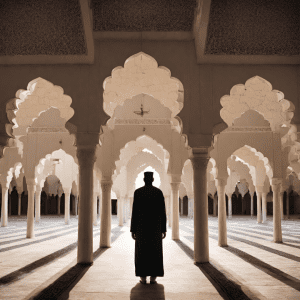The Pillars of Islam: Anchoring Faith and Shaping Lives
Islam, a religion embracing over 1.8 billion followers worldwide, finds its foundation in five core practices known as the Pillars of Islam.
1. Shahadah(The Declaration of Faith)
The very first pillar, Shahadah, represents the base of Islamic belief. It is a simple yet profound declaration – “La ilaha illallah, Muhammad-ur Rasulullah” – affirming the Oneness of God (Allah) and prophethood of Muhammad (PBUH). This declaration is not just a statement of belief; it is an act of surrender, a conscious decision to dedicate oneself to the divine will. It fosters a sense of belonging to a global community, reminding individuals they are part of something larger than themselves.
Shahadah provides a clear direction in life, grounding individuals in a set of guiding principles. It instills humility and gratitude, recognizing Allah as the creator and sustainer of all existence. By embracing this core belief, Muslims cultivate a sense of purpose and responsibility towards themselves, their communities, and the world at large.
2. Salah(The Five Daily Prayers)
Salah, the second pillar, transcends a mere ritual. It is a structured conversation with Allah, performed five times a day. These prayers punctuate the day, serving as a constant reminder of the divine presence. Prayer involves specific postures, recitations, and supplications, fostering mindfulness and inner peace.
Salah promotes discipline and self-control, requiring individuals to set aside time for spiritual rejuvenation amidst daily routines. It fosters humility and compassion as Muslims stand shoulder-to-shoulder in congregational prayers, breaking down social barriers and strengthening community bonds. Moreover, the rhythmic movements and mindful recitations act as a stress reliever, offering solace and tranquility in the midst of life’s challenges.
3. Zakat(The Compulsory Almsgiving)
Zakat, the third pillar, embodies the Islamic principle of social justice and economic responsibility. It requires Muslims to dedicate a specific portion of their wealth to help the less fortunate. Zakat purifies one’s wealth, promoting a sense of shared humanity and encouraging compassion towards those in need.
Zakat plays a crucial role in bridging the gap between rich and poor, fostering economic stability and social harmony. It promotes responsible management of wealth, reminding individuals that they are not sole owners of their possessions but rather trustees tasked with sharing their blessings. Zakat empowers communities through targeted assistance, allowing individuals to reach their full potential and contribute meaningfully to society.
4. Sawm(The Ramadan Fast)
Sawm, the fourth pillar, involves abstaining from food, drink, and sexual activity from dawn to dusk during the holy month of Ramadan. This annual practice cultivates self-discipline, empathy, and spiritual awareness. Fasting allows individuals to experience hunger and thirst firsthand, fostering compassion for those less fortunate and reminding them of the true essence of gratitude.
Sawm transcends mere hunger pangs. It strengthens willpower and self-control, while allowing individuals to focus on spiritual purification and reflection. It fosters empathy and social responsibility as Muslims share meals and prayers, strengthening community bonds and reminding them of their shared humanity. By experiencing hardship together, Muslims develop a deeper understanding of their faith and commitment to their communities. You can learn more bout the basis of Islam.
5. Hajj(The Pilgrimage to Mecca)
Hajj, the fifth pillar, represents a once-in-a-lifetime journey to Mecca, the holiest city in Islam. This physical and spiritual journey brings together Muslims from diverse backgrounds, uniting them in a shared act of devotion and sacrifice. It embodies the concept of submission to Allah and serves as a reminder of humanity’s shared origin and ultimate destination.
Hajj fosters a sense of global unity and equality, breaking down social barriers and reminding individuals of their interconnectedness. It promotes selflessness and sacrifice as pilgrims shed worldly possessions and wear simple white garments, symbolizing their spiritual cleansing and equality before God. The shared experience of Hajj reinforces the core values of Islam, leaving a lasting impact on individuals and strengthening their commitment to their faith.
